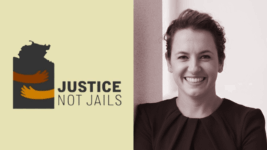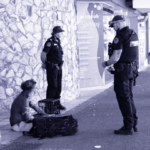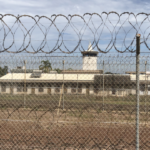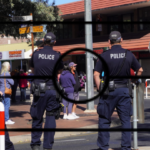NT Law-and-Order Drive Forbodes Landgrab, Says Justice Not Jails Stephen Enciso

Since taking office in August 2024, the Northern Territory Country Liberal government has gone to town with a law-and-order drive that disproportionately targets the sovereign First Peoples of the region, and as its crackdown, particularly on youth crime, only intensifies, it’s safe to say that if the Finocchiaro ministry was any less restrained, it would be attempting to launch a fresh frontier war.
On its second sitting day in office, last October, the CLP government produced five pieces of tough-on-crime legislation, which included bail amendments impacting adults and youth for presumption against bail for certain crimes, along with the reinstatement of breach of bail for children, and these laws have resulted in their targeted effect, more people in prison, in particular First Peoples.
The effect on the ground has been immediate. The number of adults on remand, or imprisoned prior to conviction, has risen by 44 percent, since the CLP came to power, and its increased by 57 percent in respect of kids. First Nations people make up 88 percent of the adults being imprisoned in the NT, while Indigenous youth always account for over 90 percent of the Territory’s child inmates.
NT chief minister Lia Finocchiaro has repeatedly shown that she doesn’t care about the criticisms of the Territory’s civil society regarding the heighten role that law enforcement and corrections is now playing in the NT’s public sphere, as she continues her reforms that appear to be singling out the over 26 percent of the jurisdiction made up of Aboriginal people, and in particular, their kids.
Sydney Criminal Lawyers spoke to Justice Not Jails spokesperson Stephen Enciso about the impact that Finocchiaro’s law-and-order drive is having on the ground in the Territory, what he considers is motivating this targeted approach to particular parts of the population and how the federal government needs to intervene and curb the extreme nature of the CLP’s law-and-order drive.
Justice Not Jails has been speaking out about the law-and order drive the Finocchiaro government launched in the NT after coming to power in August 2024, which appears to disproportionately target the over 26 percent of the local population that is Aboriginal and more specifically their kids.
This is happening in a jurisdiction that was already known for its harsh policing and corrections systems.
Stephen, can you give us a rundown about how the changes in law and how they’ve been playing out in the NT? And also, why does your group consider this is happening in the Territory right now?
Since the government was elected last August, they’ve rolled out a relentless suite of punitive reforms – so-called tough-on-crime reforms.
In October, the first tranche of those reforms came in. They included lowering the age of criminal responsibility from 12 back down to 10 years old, making bail harder to obtain for everyone, which included making stealing a serious offence, and reinstating breach of bail for youth, which was something the Royal Commission said should be scrapped.
The government has also introduced mandatory sentencing for spitting on frontline workers. There is a minimum of 3 months in gaol for an instance of spitting.
They’ve also created new criminal offences, like posting about criminal behaviour on social media, and expanded police powers to harass people drinking in public and to use metal detectors in public places, public transport and in schools.
Earlier this year, in April, the Country Liberal Party continued their crack down, in particular, on bail, which is the driver of the massive increase in incarceration in the NT.
They introduced what they described as the strongest bail laws in Australia. What they did was insert a more stringent requirement that ‘risk to community’ is the paramount consideration on granting bail. So, a judge must have a high degree of confidence in someone before they grant bail.
In July, just recently, the government introduced the first lot of changes to the Youth Justice Act. They are rewriting the whole Act. They scrapped imprisonment as a measure of last resort. They reintroduced spit hoods and restricted diversionary options.
The point of these measures is to target and punish Indigenous families and communities – to criminalise poverty in particular. We know that the overwhelming majority of people detained in the NT are Indigenous.
We know there is this vicious cycle of trauma, poverty and criminalisation, and now because of all these reforms, there is a record number of Indigenous people incarcerated in the Northern Territory.
The other thing I wanted to mention is the school attendance policy. Parents are being fined $340 when their children aren’t attending school.
It’s well document, however, that children experience racism at school or there are so many other reasons why they don’t attend, so increasing the financial strain on households is just not a compassionate way to address the issue of children feeling alienated in the education system.
That’s an overview of the big changes and the effect it’s having on the ground. As for why this is happening, well, one thing to note is that these tough-on-crime approaches to safety have been the policy of successive governments in the Territory, both Labor and the Country Liberal Party.
It is true the CLP launch polices that are particularly vicious. In the 90s, the mandatory sentencing policy that a CLP government introduced for property offences led to many people going straight to gaol over stealing, even if it was their first offence.
This further resulted in the death in custody of a 15-year-old Indigenous boy from Groote Eylandt, and there was a big uproar. The federal government was considering intervening back then, and there was a private members bill to stop mandatory sentencing.
These reforms that we are seeing now are really out of the CLP playbook. The reasons why they appear to be doing this are related to land. The government that has come to power has rolled out the red carpet for industry.
The CLP passed the Territory Coordinator Act earlier this year, and it concentrates all of this power in an unelected bureaucrat, who can override existing Territory legislation to exempt major projects from having to go through the social and environmental approvals that would normally be necessary for such projects. All of this has been done to facilitate fracking.
We know a barrier to this type of development in the NT are Traditional Owners, who’s staunch resistance can delay and even defeat such projects.
Aboriginal children are the future Traditional Owners, so if you break Aboriginal people in body and in spirit at a younger age, then they will be too traumatised when they grow up to mount effective opposition to future development projects.
So, in effect, it’s going to be easier to exploit Aboriginal land. That material motivation is arguably what is reflecting some of the overt racism in some of the CLP policies.
This is a hypothesis, but it is consistent with CLP historical policy on opposing Indigenous land rights. This party is historically the party of miners, pastoralists and big business. It is opposed to Indigenous aspirations.
When the Aboriginal Land Rights Act came in 1976, it established the land councils and it gave Traditional Owners veto rights over proposed developments on land, and the CLP hated it.
The Country Liberals have never been satisfied with that piece of federal legislation, and they have tried to undermine it in any way they can, which has included changing town boundaries to prevent groups making claims under the Act.
So, these tough-on-crime measures are related to land as well. They are designed to break down Aboriginal society, so that in the future, they can exploit Aboriginal land.
A lot of the tough-on-crime reforms appear to be a winding back of the clock in terms of changes that took place in the NT following the 2016 Don Dale revelations and the subsequent Royal Commission in its wake, but some of the changes being applied to the NT criminal justice system seem to go even further.
Are there any further specific measures you consider the broader public across the continent should be aware of?
Two things that I would single out from the youth justice law reforms, include the scraping of the principle of prison being a last resort for children, which runs counter to the UN Convention on the Rights to the Child.
This Act further allows dogs to be set on children in circumstances where there is an emergency in the detention centre, and it also expands the ability of police and prison officers to use force against children in a way that will seriously endanger their safety.
Children who are to be kept in solitary confinement now will not have mandatory access to their lawyers or their families.
And child’s criminal records will now haunt them into adulthood. So, courts will be able to see what adults have done as a child if they go before them and potentially use it against them in sentencing.
Certain developments of late have highlighted the NT chief minister’s ‘us against them’ attitude that she has towards NT civil society. The various NT land councils have stated they don’t trust the new government. The ministry has commenced enacting laws that criminalise poverty and more people are being locked up.
Of late, Finocchiaro has started stating publicly that those opposing the changes can pack up their placards and go home because her government is not listening.
Can you talk about this authoritarian streak, and the effect that the chief minister’s brazen dismissal of civil society might be having upon it?
The chief minister and the attorney general, in particular, have really made their exasperation with evidence-based policymaking very clear.
For every reform that has been introduced by this government, there have been experts, communities and people with lived experience, raising reports, inquiries and studies to show why the changes are wrong.
The most recent reforms to the Youth Justice Act saw 40 paediatricians band together to write an open letter, telling the chief minister these reforms are completely counter to the evidence of how best to support children to thrive.
The chief minister dismissed their concerns and said they should focus on sick children.
The chief minister is not generally working to produce safe communities for everyone in the Territory, and any suggestion that the government’s policies are racist is treated with contempt for the mere raising of the allegation.
Finocchiaro and her government do persistently ignore or minimise evidence regarding structural racism. The chief minister has said when she sees police, she feels safe, and what that indicates is a complete lack of empathy for Indigenous people, who face discrimination and harassment at the hands of police.
The 2017 Royal Commission into the Protection and Detention of Children in the NT found that police overcharge children with offences, and we know that almost all children detained in the NT are Indigenous.
When the NT Aboriginal Justice Agreement consolations took place in 2021, Aboriginal people said that they felt NT police treated them differently. And very recently we had the coronial findings into the death of Kumanjayi Walker handed down, and the coroner said NT police was an organisation with significant hallmarks of institutional racism.
There is an overwhelming amount of evidence about racism in NT policing, and what does the government do? It scraps the review into systemic racism in the police force and it introduces further laws to criminalise Indigenous people to increase their risk of dying in custody.
The only victims that this government recognises or cares about are those that are convenient to keep pushing its punitive agenda. An example is the CLP seized opportunistically on the stabbing death of a well-known shop owner recently by someone on bail. The government pounced on that to urgently recall parliament and pass more bail reforms in April.
Independent NT politician Yingiya Guyula said that the government was rushing to strengthen bail laws when it should be looking at community solutions, and that is exactly the point.
The government is not listening to Aboriginal communities and is instead, introducing kneejerk policy responses that just further criminalise Aboriginal communities.
So, the attitude that it has shown to civil society and Aboriginal communities is completely dismissive and, as you pointed out, its increasingly authoritarian.
The chief minister seems quite confident in her dismissals of civil society criticisms.
There is a lot of confidence in the way the chief minister is presenting herself and that’s why the federal government needs to step in and do something. The government has a very brazen attitude.
On top of your protesting the law-and-order drive, Justice Not Jails has also launched a campaign against the way Palmerstone Watchhouse is operating. What are the issues about how this police lockup is being used?
People are being detained in cruel and degrading conditions in Palmerstone Watchhouse, and because of the CLP’s new bail and sentencing reforms the NT has reached new levels of people being incarcerated.
There are so many people now incarcerated that there is no space for them, and they’ve now started using the Palmerstone Watchhouse as a remand centre. They have been doing this for some time now.
The media reports about the conditions inside the watchhouse have included people being detained for three weeks in cells, where the lights are on 24 hours a day, there is no access to outdoors, there is no privacy to go to the toilet, inmates sometimes have to eat their dinner in the same cell as someone defecating and there is little opportunity for visits from family or lawyers.
Sometimes lawyers don’t know where you are in the prison system. There is no ability to exercise while being remanded in the watchhouse.
Women have had their young babies with them in the watchhouse. Women with their periods have been refused hygiene. Some women have been wrongly identified as domestic violence perpetrators and are then detained.
An 11-year-old girl was subjected to solitary confinement in the Palmerstone Watchhouse for two days and one night straight. When the chief minister addressed this case, she said the girl was actually 12 and when she came before the judge she was refused bail anyway, so it was entirely justified for a 12-year-old to be held in solitary confinement for two days and a night.
This goes to show none of these people are considered deserving victims by the government, despite the real harm being caused to them physically and mentally by being held in these conditions.
The concept of community that is often used in considerations about bail is dehumanising, because it does not take into account people who will be potentially incarcerated as members of the community. There is a strict separation of who is in and who is out.
There is no urgency to protect people in watchhouses from ongoing harm. So, what we are going to see with the Finocchiaro government’s rewrite of youth justice laws, which has scraped imprisonment as a measure of last resort, is more children go inside to be tortured.
Even the NT Police Association has come out to say the conditions inside the watchhouse are dangerous and the risk of dying in custody is significantly increased inside. So, you can imagine just how bad these conditions are for the police to be raising the alarm about them.
All of the CLP’s policies increase the risk of dying in custody, and we should remember that, over half of all Indigenous deaths in custody have occurred on remand.
And lastly, Stephen, there are increasing calls for the federal government to intervene in the Finocchiaro government’s law-and-order drive. This is coming from politicians and legal professionals.
Canberra has the power to change NT law. However, the idea of federal government intervention in the NT carries its own baggage.
What is Justice Not Jails advocating for?
One thing I would like to clarify here is something about the Northern Territory, and that is that it derives its self-governing power via an Act of parliament. It is not an original state. It does not possess constitutional protections that states enjoy.
So, in other words, what happens in the Territory is the direct responsibility of the federal government, which maintains supreme lawmaking powers over its territories.
We need to distinguish positive intervention from negative intervention.
What we call The Intervention was a racist attack on Indigenous communities in the NT introduced by the Howard government in 2007, in response to a moral panic around so-called traditional law that relied on baseless allegations of paedophile rings in remote communities.
These false allegations were aired by the ABC, and no one has been held accountable.
The Intervention, yes, has been disastrous. It significantly curtailed the autonomy and decision-making power of remote communities, it undermined cultural authority. The Intervention led to an increased police presence in communities and contributed to an escalating incarceration rate.
But not all federal legislation that exclusively applies to the Northen Territory has been negative.
Consider the Aboriginal (Northern Territory) Land Rights Act 1976. That legislation is arguably a positive intervention that established the powerful land councils and it gave Traditional Owners veto rights over their lands.
It is the land councils that have recently come out with a joint statement, condemning the CLP’s tough-on-crime measures and human rights abuses.
The land councils can only really speak out because they are bodies created by federal legislation and thus, they are immune from NT government retaliation.
As I said earlier, successive CLP governments have done all that they can to undermine the protections afforded by the Aboriginal Land Rights Act and that is why it is so important that it exists, despite all its flaws.
What we have been advocating for is for the federal government to firstly sanction the CLP government for its human rights abuses and for its unwillingness to work with Indigenous leaders to put in place policies that will actually make everyone safe.
Natilie Hunter, who is our Indigenous spokesperson, has been campaigning for the federal government to redirect funds away from the NT government and towards Aboriginal community-controlled organisations to support their self-determining power.
Another way to reform would be federal legislation to disallow the CLP’s laws. The federal government could pass a law to abolish all presumptions against bail and abolish all mandatory sentencing conditions.
If the federal government did that it would be consistent with its goal to decrease the Indigenous incarceration rate, which is supposedly a key pillar of the Closing the Gap strategy if you look at targets 10 and 11.
The federal government could also pass an Act establishing minimum standards across the board, such as for youth justice, so as to entrench imprisonment as a measure of last resort, to prohibit the use of spit hoods, and so on.
There is a lot that the federal government could do – and should do – if it was prepared to work with Indigenous communities to develop appropriate sanctions on the NT government.
This government will just continue its relentless rampage against human rights unless it is reined in.
We have been resisting the federal government’s attempts to wash its hands of what is happening in the Territory.
What happens in the NT is the prime minister’s direct responsibility, and the human rights abuses are being enabled by the prime minister’s actions on this issue.







